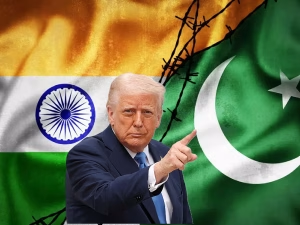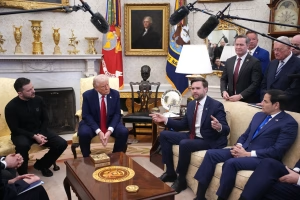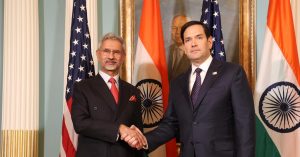Washington D.C. – United States Secretary of State Marco Rubio has made significant revelations about American foreign policy priorities, particularly regarding South Asian regional security. Marco Rubio On India Pakistan monitoring efforts demonstrates the Biden administration’s continued focus on preventing conflicts between nuclear-armed neighbors while simultaneously managing global diplomatic challenges.
During comprehensive interviews addressing multiple international conflicts, Marco Rubio On India Pakistan statements highlighted the complexity of maintaining peace in volatile regions worldwide. His comments came while discussing broader ceasefire challenges, particularly in connection with the ongoing war in Ukraine.
Daily Surveillance of Regional Tensions

Marco Rubio On India Pakistan surveillance reveals the intensive nature of American diplomatic monitoring systems. Rubio explicitly stated that the United States maintains constant vigilance over South Asian developments, emphasizing the critical importance of preventing escalation between these nuclear powers.
“Every single day we keep an eye on what’s happening between Pakistan and India,” Rubio declared, placing Marco Rubio On India Pakistan oversight alongside similar monitoring efforts in Southeast Asia, specifically mentioning Cambodia-Thailand border tensions. This comparison illustrates how the US approaches regional conflict prevention as a global strategic priority.
The daily monitoring system represents a significant commitment of diplomatic resources, highlighting how Marco Rubio On India Pakistan policy reflects broader American concerns about regional stability in strategically important areas worldwide.
Ceasefire Complexity and International Parallels

Marco Rubio On India Pakistan discussion emerged within the context of explaining why ceasefires are inherently fragile and difficult to maintain. Rubio used multiple regional examples to illustrate the challenges facing international peacekeeping efforts, with South Asian tensions serving as a prime example of ongoing vigilance requirements.
The Secretary of State emphasized that ceasefires “can fall apart very quickly,” making Marco Rubio On India Pakistan daily monitoring not just advisable but essential for preventing sudden escalations that could have catastrophic regional consequences. This perspective demonstrates how American foreign policy makers view the India-Pakistan relationship as requiring constant attention rather than periodic review.
Rubio’s analysis suggests that Marco Rubio On India Pakistan monitoring protocols have been developed based on historical understanding of how quickly diplomatic situations can deteriorate without proper oversight and early warning systems.
Ukraine War Context and Broader Implications

The Marco Rubio On India Pakistan comments gained additional significance when placed within Rubio’s broader discussion about achieving sustainable peace agreements. While addressing the three-and-a-half-year war in Ukraine, Rubio explained that the US seeks permanent peace deals rather than temporary ceasefires that might collapse.
“The only way to have a ceasefire is for both sides to agree to stop firing at one another,” Rubio explained, drawing parallels that make Marco Rubio On India Pakistan monitoring particularly relevant. The Russians’ refusal to agree to ceasefire terms in Ukraine demonstrates why proactive monitoring of other potential conflict zones becomes crucial.
This connection shows how Marco Rubio On India Pakistan oversight serves as both a preventive measure and a strategic example of successful conflict management that could inform approaches to other international disputes.
Trump Administration Peace Claims
Marco Rubio On India Pakistan achievements were specifically highlighted when discussing the Trump administration’s peace-building record. Rubio repeated claims previously made by President Donald Trump about successful diplomatic interventions in various regional conflicts, including South Asian tensions.
“We are very fortunate and blessed and should be thankful to have a President who has made peace and the achievement of peace a priority of his administration,” Rubio stated, specifically mentioning Marco Rubio On India Pakistan efforts alongside other regional successes in Cambodia-Thailand relations.
These claims about Marco Rubio On India Pakistan peace achievements reflect the administration’s desire to highlight diplomatic successes while establishing credibility for future international mediation efforts.
Also Read: Big Statement By Ukraine President on Alaska Meeting says, “I’ll Meet Putin”
Indian Government Response and Diplomatic Clarifications


However, Marco Rubio On India Pakistan peace claims have encountered contradictory statements from Indian leadership regarding specific operations. Prime Minister Narendra Modi’s parliamentary discussion of Operation Sindoor included explicit denial of any foreign leader requesting India to halt military operations.
External Affairs Minister S Jaishankar similarly stated that no third-party intervention occurred in reaching ceasefire arrangements with Pakistan during Operation Sindoor. These statements create tension with Marco Rubio On India Pakistan peace facilitation claims, suggesting potential discrepancies between American and Indian perspectives on diplomatic involvement.
The contradiction raises questions about the accuracy of Marco Rubio On India Pakistan mediation claims and whether such statements reflect actual diplomatic achievements or political rhetoric designed for domestic American consumption.
Strategic Implications for Regional Security
Marco Rubio On India Pakistan monitoring commitment reflects broader American strategic interests in maintaining stability between nuclear-armed nations. The daily surveillance system indicates recognition that South Asian conflicts could rapidly escalate beyond regional boundaries, potentially requiring immediate American diplomatic intervention.
This comprehensive approach to Marco Rubio On India Pakistan relations demonstrates how contemporary American foreign policy integrates conflict prevention with broader global security strategies, treating regional tensions as interconnected elements of international stability rather than isolated bilateral issues.

